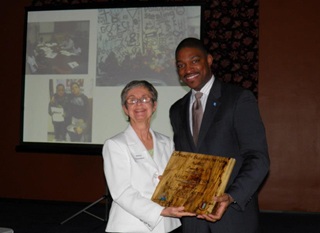Tailor Volunteer Appreciation in Community Organizations to the Audience
September 23, 2025
Imagine that you spend your spare time working hard in a community organization for legislation that would allow new investment in your neighborhood. A new executive director has been carefully taught in other settings about how to recognize people who contribute their time and talents. She thinks that you want your name on a plaque inside the office.
Now do you?
 Yes, it's a plaque, but an artist-made one.
Yes, it's a plaque, but an artist-made one.Maybe you would like that, but maybe you want something a little more personal and special. How about a framed photo of you speaking to a legislative committee?
The same thing applies in neighborhood groups. In fact, volunteer appreciation in community organizations often is either completely ignored, or it is given in ways that lack meaning to the recipient.
Let's say you are the president of a neighborhood association. Most of your board members are older retired women, many of whom are single. Do you think you should treat them to a couples-oriented Valentine's Day dance at a motel, featuring the region's loudest band? Probably not, although you could ask them if they like your sense of humor.
Maybe they would love to have a swanky lunch at a nice restaurant, or maybe they would like something much more concrete, such as a framed vintage photo of a beloved neighborhood landmark of yesteryear.
What Is Appropriate Recognition for Volunteers?
It should be obvious from the two examples above that it pays not to be tone deaf when recognizing your volunteers. This raises an immediate problem though.
What if one volunteer really craves seeing her name in lights, and the next one would only be embarrassed and downright unappreciative of exactly the same treatment?
That's why I like to see executive directors and boards being creative in their recognition. You don't have to recognize a dozen people at the same time for the same project in the same way. If you feel this is appropriate to your situation, then make the recognition minimal in expense and something like a certificate that can be printed in your office. Then work for more meaningful recognition in an individual way for each person.
I like spreading out the appreciation over the course of the year, rather than lumping it all into one awards ceremony. If this is feasible within your organizational culture, definitely do it this way, and think up a token of your appreciation that is unique, or nearly so, for each individual. Invent new awards as needed, such as the Best Volunteer in Greeting Visitors, Best Volunteer in Selecting Goods for the Food Pantry, Most Successful Ticket Salesperson, and so forth. If you name your awards for the past heroes of your organization or community, that's great. You can come up with award names that are much more creative than these examples.
Perhaps your organization only gets together once a year, and you need these awards to large numbers of people because that if your only occasion for getting everyone together throughout the year. That's when you give everyone the same thing, but different. How is that possible? Well, maybe everyone receives a framed photo of themselves in action, or of a client who they are especially fond of or involved with. You can maneuver all of these into these into a memorable part of the occasion by capturing the photos digitally, and projecting them along with a sentence or two about the significance of that photo and how it involves the recipient.
Being Mindful of Comparisons and Jealousy
The problem inherent in volunteer appreciation in community organizations is that if you are not careful, someone's heartfelt contributions or sacrificial efforts inevitably are overlooked. Seek to minimize that through treating every volunteer incredibly well. Make expression of thanks a part of every departure from your event or office, if at all possible.
If you're having an event specific to volunteer appreciation, make sure every single volunteer comes away with something they didn't have before. Whether that is a single carnation in a vase, or a T-shirt, mug, bookmark, calendar, or something else, give every volunteer something. In a community organization, this may be tough, as that may mean that you are creating an unknown quantity of takeaways, but do your best. This means that the take-home token of appreciation is not expensive in your organization's scheme of things, and ideally you have a plan for the unclaimed flowers or tokens.
This last paragraph raises yet another point about volunteer appreciation for community and neighborhood associations. In more affluent neighborhoods, the last thing your typical member needs is another T-shirt. Be mindful of trying to give them something they can always use in greater quantity. Or just straight out ask the recipients to re-gift your item if they don't need it. In some types of organizations, this will be very well received.
The issue of potential jealousy and hard feelings is one of the reasons I like the idea of spreading multiple award occasions throughout the year. Let the non-recipient hold out the secret hope that next time, their name will be the one that is called.
Being Sensitive to Cultural Context
As we have hinted, it is really important to be careful to show true appreciation of your volunteers, rather than mindlessly copying what business does or how you think other organizations work. If you hold an event that is primarily a volunteer appreciation occasion, choose a venue and specific setting that will be meaningful to your group. Grandmas may not want to go to the skatepark, many soccer moms and dads won't want to sit through a long formal presentation where they have to dress up, but maybe a group of primarily African-American matriarchs really will appreciate a dressy occasion at somewhere they ordinarily would not frequent. Think carefully about the common denominator for your group, and then of course shake it up just a little bit so that the event is not entirely predictable and boring.
The last piece of advice is to keep any event organized specifically for volunteer recognition fairly short and simple in concept. Long ceremonies really aren't in style anywhere in U.S. society, except for perhaps a few ethnic groups. Quite the contrary. In many of your community organizations, there aren't enough opportunities for the members and volunteers to just socialize with one another. Leave some open space for conversation, reminiscing, and dreaming together about the next phase for your community organization or their personal lives.
More pages of Interest to Community Organizations
- Community Development >
- Community Organizations > Volunteer Appreciation in Community Organizations
Join GOOD COMMUNITY PLUS, which provides you monthly with short features and tips about timely topics for neighborhoods, towns and cities, community organizations, and rural or small town environments. Unsubscribe any time. We expect to send just one more issue before we abandon this website and move to other projects. Sign up to see our final words of wisdom.




